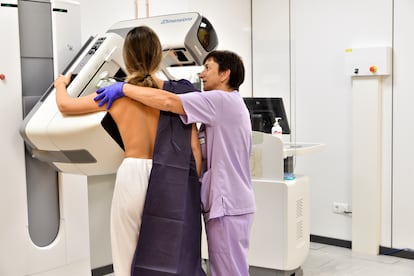Speaking of cancer
Broaching the subject directly can raise awareness and encourage testing

U.S. Defense Secretary Lloyd Austin has prostate cancer. The news came out on Tuesday, January 9, after it was revealed he had been in intensive care due to an infection from surgery in December. “No one in the White House knew that Secretary Austin had cancer,” the U.S. press secretary acknowledged. EL PAÍS journalist Macarena Vidal Liy explains that the Pentagon spokesman wanted to excuse Austin by maintaining that cancer and its treatment are “deeply personal.” But why hide the fact that he is being treated for the fourth-most diagnosed cancer in the world?
CNN journalist Sara Sidner, meanwhile, has been totally transparent about the fact she has cancer. She announced it this week at the end of her program. She suffers from stage three breast cancer. “It’s hard to say it out loud,” she said. “I am in my second month of chemotherapy. I will undergo radiotherapy and a double mastectomy.” She went on to talk about the chances of a cure — “stage three is no longer a death sentence for most women” regarding breast cancer — and the importance of regular medical check-ups for early detection.
Please for the love of God get your mammograms and do your self exams. I want you to thrive my sisters. 🩷🩷🩷🩷🩷🩷🩷 pic.twitter.com/jIuW8WwSb2
— Sara Sidner (@sarasidnerCNN) January 8, 2024
Another recent case is that of actress Nicole Eggert, who played Summer Quinn in Baywatch, who told People magazine she had breast cancer. At first, she thought it was a symptom of the menopause; she felt a lump in her breast and sought a diagnosis. The cancer was detected. Now, a friend has set up a fund-raising campaign to help the actress meet the cost of the treatment and surgery in the costly U.S. healthcare system.
Talking about cancer without beating around the bush can serve to make society aware that we are all potentially at risk and, when in doubt, should go to a doctor so the disease can be detected early and treated with the best possible guarantees. When news of Sara Sidner and Nicole Eggert’s cancer spread on social networks, the response was — as expected — one of support and gratitude for their transparency and the use of their platform to raise awareness and normalize the issue.
However, you don’t always need that kind of platform to raise awareness. For example, a college friend, Paula, noticed a mole she had on one arm had changed color, had grown and its edges become irregular. The primary care physician referred her directly to a dermatologist, who decided to remove it. It was a melanoma detected in time. She has subsequently talked openly about her experience prompting many of her acquaintances to make dermatology appointments. Two of them have had malignant moles removed.
According to a report by the Spanish Society of Medical Oncology, 41.1% of men up to the age of 80 are at risk from cancer; this figure drops to 28% for women. The probability increases after the age of 85. At that age, men have a 48.4% probability of developing the condition compared to 32.4% for women. Roughly speaking, it is said that one in two men and one in three women will develop some type of cancer during their lifetime. Surely this is reason enough to talk openly about the disease? It is necessary to approach it without shame, without fear, to know its risks, and the importance of having the pertinent analyses as soon as we see that something is not right. Above all, more research is needed.
Sign up for our weekly newsletter to get more English-language news coverage from EL PAÍS USA Edition
Tu suscripción se está usando en otro dispositivo
¿Quieres añadir otro usuario a tu suscripción?
Si continúas leyendo en este dispositivo, no se podrá leer en el otro.
FlechaTu suscripción se está usando en otro dispositivo y solo puedes acceder a EL PAÍS desde un dispositivo a la vez.
Si quieres compartir tu cuenta, cambia tu suscripción a la modalidad Premium, así podrás añadir otro usuario. Cada uno accederá con su propia cuenta de email, lo que os permitirá personalizar vuestra experiencia en EL PAÍS.
¿Tienes una suscripción de empresa? Accede aquí para contratar más cuentas.
En el caso de no saber quién está usando tu cuenta, te recomendamos cambiar tu contraseña aquí.
Si decides continuar compartiendo tu cuenta, este mensaje se mostrará en tu dispositivo y en el de la otra persona que está usando tu cuenta de forma indefinida, afectando a tu experiencia de lectura. Puedes consultar aquí los términos y condiciones de la suscripción digital.









































